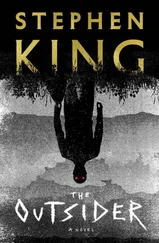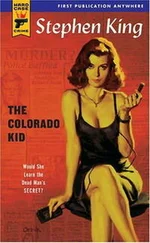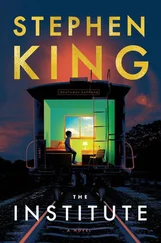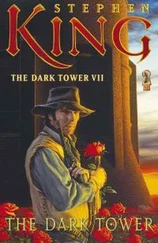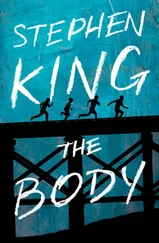Now they were closer.
Don't jump the gun, wait, just wait …
He shivered at the edge of the window, brought the brick forward, drew it back to his stomach, brought it forward again, withdrew it again (but this time only halfway), and then leaned out, totally cool now. He always was at the penultimate moment.
He dropped the brick and watched it fall.
It went down, swapping one end for the other. Jack saw the clinging barnacles of mortar clearly in the sun. At these moments as at no others everything was clear, everything stood out with exact and geometrically perfect substance; here was a thing which he had pushed into reality, as a sculptor swings a hammer against a chisel to change stone and create some new substance from the brute caldera; here was the world's most remarkable thing: logic which was also ecstasy.
Sometimes he missed or struck aslant, as the sculptor may carve badly or in vain, but this was a perfect shot. The brick struck the girl in the bright gingham dress squarely on the head. He saw blood—it was brighter than the brick but would eventually dry to the same maroon color—splash up. He heard the start of the mother's scream. Then he was moving.
Jack crossed the room and threw the chair which had been under the knob into a far corner (he'd kicked the other—the one he'd sat in while waiting—aside as he crossed the room). He yanked up the sweatshirt and pulled a bandanna from his back pocket. He used it to turn the knob.
No fingerprints allowed.
Only Don't Bees left fingerprints.
He stuffed the bandanna into his back pocket again even as the door was swinging open. As he walked down the hall, he assumed a faintly drunken gait. He didn't look around.
Looking around was also only for Don't Bees.
Do Bees knew that trying to see if someone was noticing you was a sure way to accomplish just that. Looking around was the sort of thing a witness might remember after an accident. Then some smartass cop might decide it was a suspicious accident, and there would be an investigation. All because of one nervous glance around. Jack didn't believe anyone could connect him with the crime even if someone decided the "accident" was suspicious and there was an investigation, but …
Take only acceptable risks. Minimize those which remain.
In other words, always prop a chair under the doorknob.
So he walked down the powdery corridor where patches of lathing showed through the plastered walls, he walked with his head down, mumbling to himself like the vags you saw on the street. He could still hear the woman—the mother of the little girl, he supposed—screaming, but that sound was coming from the front of the building; it was faint and unimportant. All of the things which happened after— the cries, the confusion, the wails of the wounded (if the wounded were still capable of wailing), were not things which mattered to Jack. What mattered was the thing which pushed change into the ordinary course of things and sculpted new lines in the flow of lives … and, perhaps, the destinies not only of those struck, but of a widening circle around them, like ripples from a stone tossed into a still pond.
Who was to say that he had not sculpted the cosmos today, or might not at some future time?
God, no wonder he creamed his jeans!
He met no one as he went down the two flights of stairs but he kept up the act, swaying a little as he went but never reeling. A swayer would not be remembered. An ostentatious reeler might be. He muttered but didn't actually say anything a person might understand. Not acting at all would be better than hamming it up.
He let himself out the broken rear door into an alley filled with refuse and broken bottles which twinkled galaxies of sun-stars.
He had planned his escape in advance as he planned everything in advance (take only acceptable risks, minimize those which remain, be a Do Bee in all things); such planning was why he had been marked by his colleagues as a man who would go far (and he did intend to go far, but one of the places he did not intend to go was to jail, or the electric chair).
A few people were running along the street into which the alley debouched, but they were on their way to see what the screaming was about, and none of them looked at Jack Mort, who had removed the out-of-season knit cap but not the sunglasses (which, on such a bright morning, did not seem out of place).
He turned into another alley.
Came out on another street.
Now he sauntered down an alley not so filthy as the first two—almost, in fact, a lane. This fed into another street, and a block up there was a bus stop. Less than a minute after he got there a bus arrived, which was also part of the schedule. Jack entered when the doors accordioned open and dropped his fifteen cents into the slot of the coin receptacle. The driver did not so much as glance at him. That was good, but even if he had, he would have seen nothing but a nondescript man in jeans, a man who might be out of work—the sweatshirt he was wearing looked like something out of a Salvation Army grab-bag.
Be ready, be prepared, be a Do-Bee.
Jack Mort's secret for success both at work and at play.
Nine blocks away there was a parking lot. Jack got off the bus, entered the lot, unlocked his car (an unremarkable mid-fifties Chevrolet which was still in fine shape), and drove back to New York City .
He was free and clear.
The gunslinger saw all of this in a mere moment. Before his shocked mind could shut out the other images by simply shutting down, he saw more. Not all, but enough. Enough.
He saw Mort cutting a piece from page four of The New York Daily Mirror with an Exacto knife, being fussily sure to stay exactly upon the lines of the column. NEGRO GIRL COMATOSE FOLLOWING TRAGIC ACCIDENT, the headline read. He saw Mort apply glue to the back of the clipping with the brush attached to the cover of his paste-pot. Saw Mort position it at the center of a blank page of a scrapbook, which, from the bumpy, swelled look of the foregoing pages, contained many other clippings. He saw the opening lines of the piece: "Five-year-old Odetta Holmes, who came to Elizabethtown , N.J. , to celebrate a joyous occasion, is now the victim of a cruel freak accident. Following the wedding of an aunt two days ago, the girl and her family were walking toward the railway station when a brick tumbled …"
But that wasn't the only time he'd had dealings with her, was it? No. Gods, no.
In the years between that morning and the night when Odetta had lost her legs, Jack Mort had dropped a great many things and pushed a great many people.
Then there had been Odetta again.
The first time he had pushed something on her.
The second time he had pushed her in front of something.
What sort of man is this that I am supposed to use? What sort of man—
But then he thought of Jake, thought of the push which had sent Jake into this world, and he thought he heard the laughter of the man in black, and that finished him.
Roland fainted.
When he came to, he was looking at neat rows of figures marching down a sheet of green paper. The paper had been ruled both ways, so that each single figure looked like a prisoner in a cell.
He thought: Something else.
Not just Walter's laughter. Something—a plan?
No, Gods, no—nothing as complex or hopeful as that.
But an idea, at least. A tickle.
How long have I been out? he thought with sudden alarm. It was maybe nine o' the clock when I came through the door, maybe a little earlier. How long—?
Читать дальше

